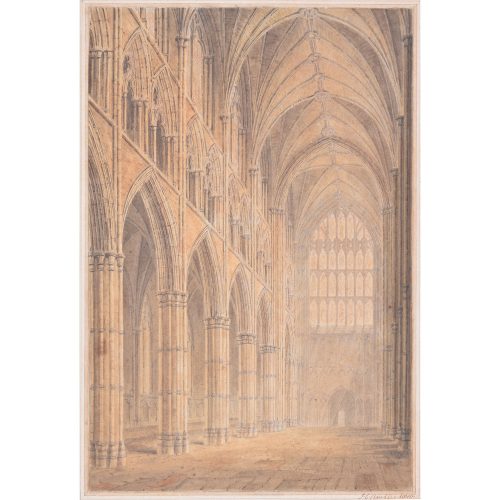-
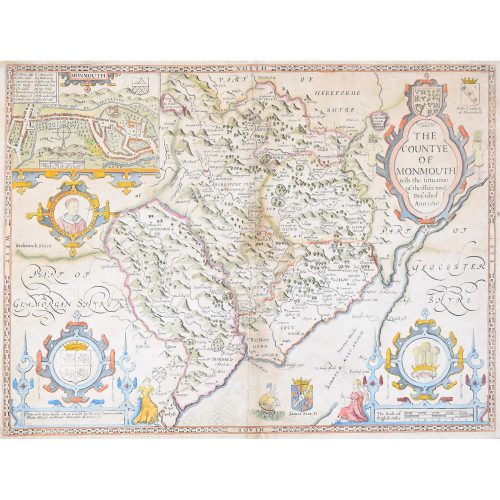
John Speed/Speede (1551/2-1629) The Countye of Monmouthshire
Performed by John Speede assisted by William Smyth. And are to be sold by Henry Overton at the White Horse without Newgate London. Printed 1710-1743 Probably the most famous early English mapmaker, John Speed's early life is somewhat of an enigma. He is believed to have trained as a rolling-press printer, but he was at heart an historian granted a sinecure in the Customs House by Queen Elizabeth to indulge his passion, later becoming a Fellow of the Society of Antiquaries. His first maps were historical, of the Holy Land 'Canaan as it was Possessed both in Abraham and Israels Dayes' and of England and Ireland recording 'all their Civill Warres since the Conquest'. In 1611 he published his 'Hostory of Great Britaine' which he regarded as his magnum opus, but it was the companion atlas 'Theatre of the Empire of Great Britaine' that - as the first printed atlas of Great Britain - sealed his reputation. William Rogers engraved the first map, 'the County Palatine of Chester' in about 1600, but following his untimely death the task of engraving was passed to Jodocus Hondius of Amsterdam. By 1612 the atlas was complete, the maps famed for their decorative elements. Many have town plans - Britain's first series of such plans - and descriptive text was printed to the reverse until the 1676 edition. Later printings (up until 1770) were issued without this text. By 1627 it has become a part of a world atlas 'Prospect of the Most Famous Parts of the World'. During the 17th century the plates passed through the hands of a series of publishers, the 1676 edition of Thomas Bassett and Richard Chiswell being regarded as its high point with the inclusion for the first time of a series of important maps. For the first half of the eighteenth century they were firmly established in the hands of the Overton family. If you are interested email info@manningfineart.co.uk or call us on 07929 749056. Condition: Small losses outside platemark just reaching platemark at top, with some toning to paper as usual. Later but well undertaken hand-colouring. Generally good condition. -
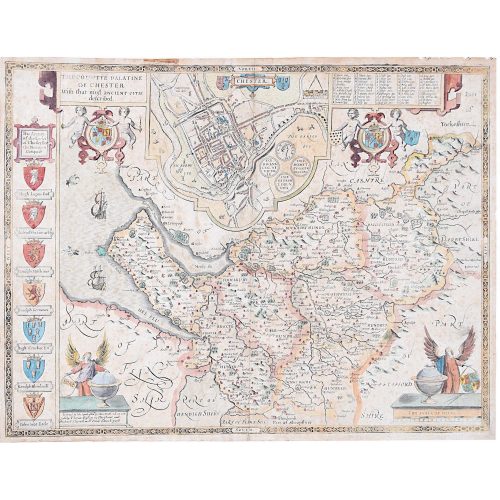
John Speed/Speede (1551/2-1629) The Countye Palatine of Chester with that most ancient citie
39x51cm Engraving Probably the most famous early English mapmaker, John Speed's early life is somewhat of an enigma. He is believed to have trained as a rolling-press printer, but he was at heart an historian granted a sinecure in the Customs House by Queen Elizabeth to indulge his passion, later becoming a Fellow of the Society of Antiquaries. His first maps were historical, of the Holy Land 'Canaan as it was Possessed both in Abraham and Israels Dayes' and of England and Ireland recording 'all their Civill Warres since the Conquest'. In 1611 he published his 'Hostory of Great Britaine' which he regarded as his magnum opus, but it was the companion atlas 'Theatre of the Empire of Great Britaine' that - as the first printed atlas of Great Britain - sealed his reputation. William Rogers engraved the first map, 'the County Palatine of Chester' in about 1600, but following his untimely death the task of engraving was passed to Jodocus Hondius of Amsterdam. By 1612 the atlas was complete, the maps famed for their decorative elements. Many have town plans - Brtiain's first series of such plans - and descriptive text was printed to the reverse until the 1676 edition. Later printings (up until 1770) were issued without this text. By 1627 it has become a part of a world atlas 'Prospect of the Most Famous Parts of the World'. During the 17th century the plates passed through the hands of a series of publishers, the 1676 edition (as here) of Thomas Bassett and Richard Chiswell being regarded as its high point with the inclusion for the first time of a series of important maps. If you are interested email info@manningfineart.co.uk or call us on 07929 749056. Condition: Trimmed and other small losses outside platemark. Some toning and spotting to paper as usual. Later but well undertaken hand-colouring. Old tape mark to top outside platemark. Generally good condition. -
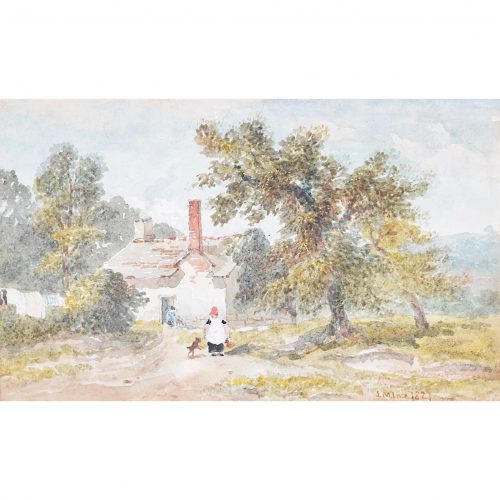
Joseph Murray Ince (1806-1859) Outside Welsh Border Cottage - Summer
Watercolour 10.5x17.5cm Provenance (label to reverse) Fine Art Society 1971 Signed lower right 'J M Ince 1827' Brought up in Radnorshire, in the Welsh Borders, Ince studied under David Cox from 1823-1826, and then exhibited at the Royal Academy. He was a drawing master at Cambridge University during the 1830s, during which period he painted many views of the Colleges of both Oxford and Cambridge, returning to Radnorshire in 1835. His works are in the collections of major galleries including the Tate, The V&A and The Fitzwilliam Museum in Cambridge. -
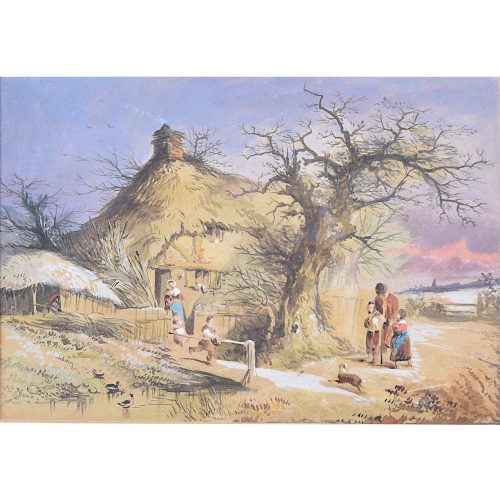
Attributed to Joseph Murray Ince (1806-1859) Outside Welsh Border Cottage - Winter
Watercolour 10.5x17.5cm Brought up in Radnorshire, in the Welsh Borders, Ince studied under David Cox from 1823-1826, and then exhibited at the Royal Academy. He was a drawing master at Cambridge University during the 1830s, during which period he painted many views of the Colleges of both Oxford and Cambridge, returning to Radnorshire in 1835. His works are in the collections of major galleries including the Tate, The V&A and The Fitzwilliam Museum in Cambridge. Click to view other works by Ince. -
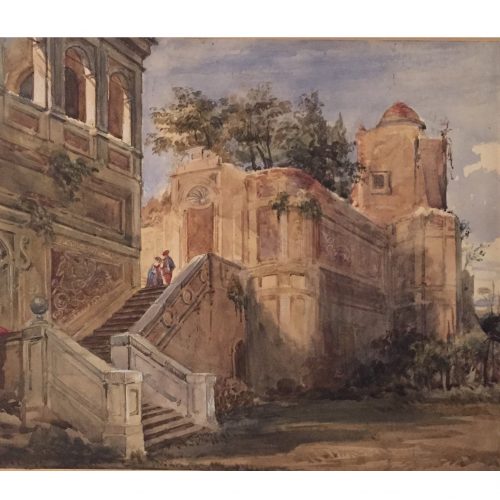
Attributed to Joseph Nash (1808-1878) 'Ruins of an Italian Villa'
Watercolour 24 x 29cm If you are interested email info@manningfineart.co.uk or call us on 07929 749056. Condition: Excellent. -
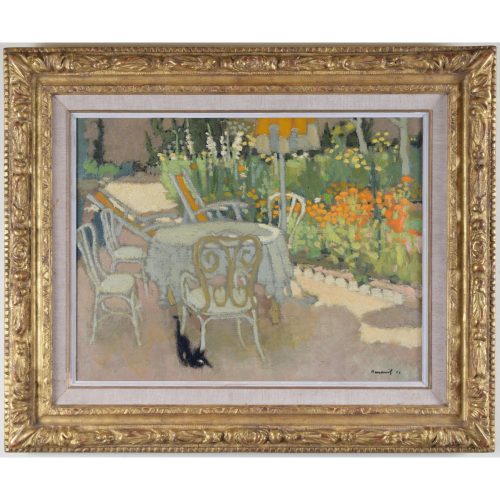
Michel Dureil (1929 - 2011)
La Table du Jardin / Garden Table with a Black Cat
Oil on canvas 35 x 44 cm A black cat stretches beside a typical French table, observed by bright orange flowers. Orange cushions and an orange sun-umbrella complete the scene. Condition: very good. If you are interested, please email info@manningfineart.co.uk or call us on 07929 749056. -
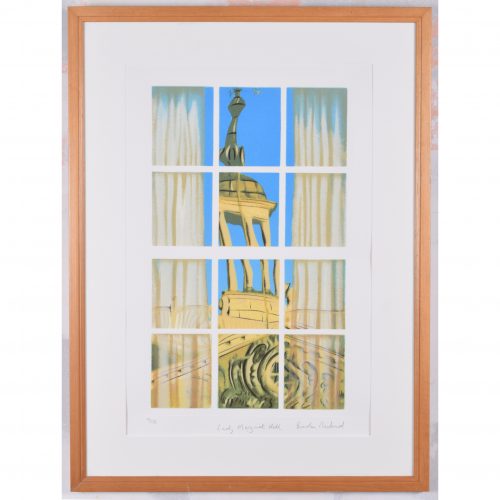
Brendan Neiland (b. 1941) R.A. (Expelled)
Lady Margaret Hall
Screenprint 46 x 27 cm Signed, titled, and numbered 42/175 in pencil. A screenprint of the cupola atop Lady Margaret Hall's Talbot Building. Reflected architecture is one of Neiland’s most recurring themes. Neiland's work is widely exhibited in major museums and galleries worldwide including, in Britain, the Victoria and Albert Museum, The Tate Gallery London, The Collections of the British Council, and the Arts Council of Great Britain. He is represented by the Redfern Gallery and has had numerous shows internationally, including at the Galerie Belvedere in Singapore, who represent him in Singapore and the Far East. Condition: very good. If you are interested, please email info@manningfineart.co.uk or call us on 07929 749056. Click here for other views of Lady Margaret Hall. -
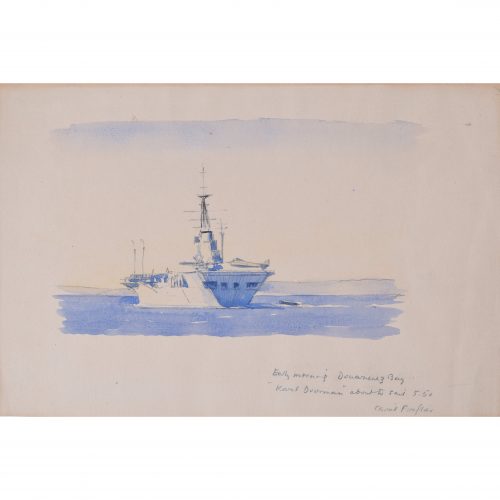
Laurence Dunn (1910-2006)
Karel Doorman About to Sail
Watercolour 15 x 23 cm (sheet size 99 x 73 cm) Signed to backing board, with extensive inscription by Dunn. HNLMS Karel Doorman (R81) was a Colossus-class aircraft carrier of the Royal Netherlands Navy. Formerly the British ship HMS Venerable, she was sold to the Netherlands in 1948 as a light attack carrier. In 1960, she was involved in the decolonization conflict in Western New Guinea with Indonesia. In the mid 1960s, her role was changed to anti-submarine warfare carrier and only ASW aircraft and helicopters were carried. An engine room fire took her out of service in 1968. She was sold to Argentina in 1969 and renamed ARA Veinticinco de Mayo. Laurence Dunn was an artist known for his depictions of ships. He grew up in Devon, where he practised drawing passing ships, and went on to study at the Central School of Art. He then worked for shipbuilding firm John I. Thornycroft & Company Limited, where he assisted with the design of the royal yacht.During the Second World War, Dunn worked for naval intelligence. In the early 1960s he created many line drawings of Atlantic ocean liners. The World Ship Society published the following obituary for Laurence Dunn in 2006: DUNN, Laurence. [December 15 2006 — Lloyds List] Many readers will be saddened by the death of well-known marine artist and writer Laurence Dunn in his 97th year. A man of encyclopaedic knowledge, he began his lifelong love of ships in Brixham, where he meticulously recorded passing traffic with the exquisitely accurate line drawings which later became something of a trademark. While studying at London’s Central School of Art his work was noticed by the Southern Railway, which commissioned profiles of its fleet, and this in turn led to work for Orient Line, where he also designed the well-known corn-coloured hull, and later Thorneycroft, where he helped with shaping draft plans for a new royal yacht. During the second world was he worked for naval intelligence at the Admiralty, where his technique did much to improve recognition standards, and greatly expanded his shipping clientele, becoming personally known to many chairmen. As well as the shipping press he worked for mainstream publications such as Everybody’s, Sphere and the upmarket comic Eagle. Through his many contacts he enjoyed going to sea in a great variety of ships from aircraft carriers to colliers. Laurence wrote several books, starting with ship recognition titles which introduced new standards of layout, but his best known work was probably Passenger Liners, which was widely taken up by the travel trade. His love of Greece, where he was an early publicist of island cruising, let to involvement in reshaping various passenger liners beginning with Greek Line’s OLYMPIA. In later life he designed several sets of shipping stamps for the Crown Agents, produced photographic volumes on Thames and Mediterranean shipping and still found time to enjoy the passing Thames traffic. Our sympathies go to his wife Jennifer, who provided succour to the many ship lovers who beat a path to the welcoming door of their Gravesend home. Condition: very good. If you'd like to know more, please email info@manningfineart.co.uk or call us on 07929 749056. -
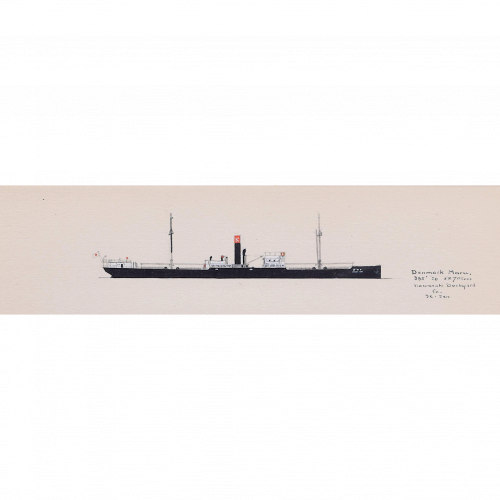
Laurence Dunn (1910-2006)
SS Denmark Maru (c.1927)
4 x 17 cm Ink and bodycolour on paper SS Denmark Maru was built by Kawasaki Shipyard Co in Japan. Until 1935 she was in service on K Line's Hamburg - New York route. Dunn's drawings of coastal tramps are early works, likely sketched from the side of the Thames estuary near his home. The World Ship Society published the following obituary for the well-published maritime artist and writer in 2006: DUNN, Laurence. [December 15 2006 — Lloyds List] Many readers will be saddened by the death of well-known marine artist and writer Laurence Dunn in his 97th year. A man of encyclopaedic knowledge, he began his lifelong love of ships in Brixham, where he meticulously recorded passing traffic with the exquisitely accurate line drawings which later became something of a trademark. While studying at London’s Central School of Art his work was noticed by the Southern Railway, which commissioned profiles of its fleet, and this in turn led to work for Orient Line, where he also designed the well-known corn-coloured hull, and later Thorneycroft, where he helped with shaping draft plans for a new royal yacht. During the second world was he worked for naval intelligence at the Admiralty, where his technique did much to improve recognition standards, and greatly expanded his shipping clientele, becoming personally known to many chairmen. As well as the shipping press he worked for mainstream publications such as Everybody’s, Sphere and the upmarket comic Eagle. Through his many contacts he enjoyed going to sea in a great variety of ships from aircraft carriers to colliers. Laurence wrote several books, starting with ship recognition titles which introduced new standards of layout, but his best known work was probably Passenger Liners, which was widely taken up by the travel trade. His love of Greece, where he was an early publicist of island cruising, let to involvement in reshaping various passenger liners beginning with Greek Line’s OLYMPIA. In later life he designed several sets of shipping stamps for the Crown Agents, produced photographic volumes on Thames and Mediterranean shipping and still found time to enjoy the passing Thames traffic. Our sympathies go to his wife Jennifer, who provided succour to the many ship lovers who beat a path to the welcoming door of their Gravesend home. Condition: Generally very good, slight toning to paper. If you'd like to know more, please email info@manningfineart.co.uk or call us on 07929 749056. -
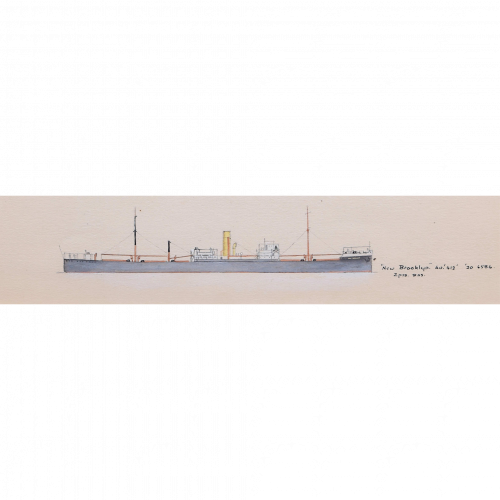
Laurence Dunn (1910-2006)
SS New Brooklyn (c.1927)
4 x 17 cm Ink and bodycolour on paper SS New Brooklyn was built in Belfast by Harland & Wolff in 1920 for Elder Dempster & Co, and was known initially as New Romance. In 1954, she was sold to Mageolia Nav SA, Panama and renamed Marianna. She was scrapped in 1959 at La Spezia. She was an 'N' Type fabricated ship with straight frames which was introduced in 1917 to utilise the capacity of bridge building companies which had very little of their normal bridge-building work to do during the war. Dunn's drawings of coastal tramps are early works, likely sketched from the side of the Thames estuary near his home. The World Ship Society published the following obituary for the well-published maritime artist and writer in 2006: DUNN, Laurence. [December 15 2006 — Lloyds List] Many readers will be saddened by the death of well-known marine artist and writer Laurence Dunn in his 97th year. A man of encyclopaedic knowledge, he began his lifelong love of ships in Brixham, where he meticulously recorded passing traffic with the exquisitely accurate line drawings which later became something of a trademark. While studying at London’s Central School of Art his work was noticed by the Southern Railway, which commissioned profiles of its fleet, and this in turn led to work for Orient Line, where he also designed the well-known corn-coloured hull, and later Thorneycroft, where he helped with shaping draft plans for a new royal yacht. During the second world was he worked for naval intelligence at the Admiralty, where his technique did much to improve recognition standards, and greatly expanded his shipping clientele, becoming personally known to many chairmen. As well as the shipping press he worked for mainstream publications such as Everybody’s, Sphere and the upmarket comic Eagle. Through his many contacts he enjoyed going to sea in a great variety of ships from aircraft carriers to colliers. Laurence wrote several books, starting with ship recognition titles which introduced new standards of layout, but his best known work was probably Passenger Liners, which was widely taken up by the travel trade. His love of Greece, where he was an early publicist of island cruising, let to involvement in reshaping various passenger liners beginning with Greek Line’s OLYMPIA. In later life he designed several sets of shipping stamps for the Crown Agents, produced photographic volumes on Thames and Mediterranean shipping and still found time to enjoy the passing Thames traffic. Our sympathies go to his wife Jennifer, who provided succour to the many ship lovers who beat a path to the welcoming door of their Gravesend home. Condition: Generally very good, slight toning to paper. If you'd like to know more, please email info@manningfineart.co.uk or call us on 07929 749056. -
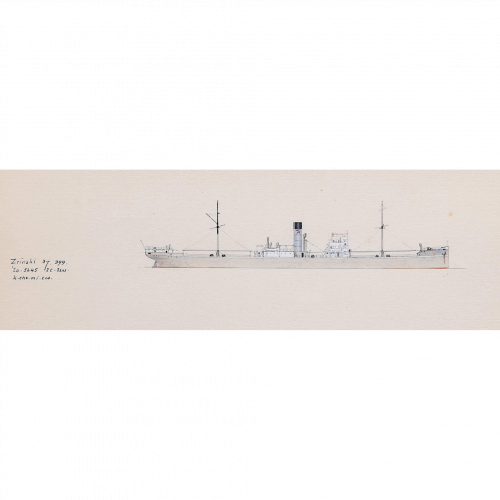
Laurence Dunn (1910-2006)
SS Zrinski (c.1925)
4 x 17 cm Ink and bodycolour on paper Zrinski was built by the Northumberland Shipbuilding Co Ltd. Following a period in Norwegian ownership it was transferred to Yugoslavian ownership in 1927. In 1940 it was acquired by the Crest Shipping Co Ltd, and sunk by German U-Boat U-140 on 8 December 1940 - as SS Ashcrest. Dunn's drawings of coastal tramps are early works, likely sketched from the side of the Thames estuary near his home. The World Ship Society published the following obituary for the well-published maritime artist and writer in 2006: DUNN, Laurence. [December 15 2006 — Lloyds List] Many readers will be saddened by the death of well-known marine artist and writer Laurence Dunn in his 97th year. A man of encyclopaedic knowledge, he began his lifelong love of ships in Brixham, where he meticulously recorded passing traffic with the exquisitely accurate line drawings which later became something of a trademark. While studying at London’s Central School of Art his work was noticed by the Southern Railway, which commissioned profiles of its fleet, and this in turn led to work for Orient Line, where he also designed the well-known corn-coloured hull, and later Thorneycroft, where he helped with shaping draft plans for a new royal yacht. During the second world was he worked for naval intelligence at the Admiralty, where his technique did much to improve recognition standards, and greatly expanded his shipping clientele, becoming personally known to many chairmen. As well as the shipping press he worked for mainstream publications such as Everybody’s, Sphere and the upmarket comic Eagle. Through his many contacts he enjoyed going to sea in a great variety of ships from aircraft carriers to colliers. Laurence wrote several books, starting with ship recognition titles which introduced new standards of layout, but his best known work was probably Passenger Liners, which was widely taken up by the travel trade. His love of Greece, where he was an early publicist of island cruising, let to involvement in reshaping various passenger liners beginning with Greek Line’s OLYMPIA. In later life he designed several sets of shipping stamps for the Crown Agents, produced photographic volumes on Thames and Mediterranean shipping and still found time to enjoy the passing Thames traffic. Our sympathies go to his wife Jennifer, who provided succour to the many ship lovers who beat a path to the welcoming door of their Gravesend home. Condition: Generally very good, slight toning to paper. If you'd like to know more, please email info@manningfineart.co.uk or call us on 07929 749056. -
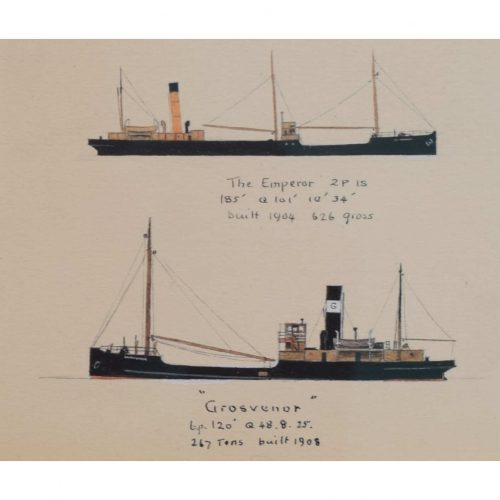
Laurence Dunn (1910 - 2006)
The Emperor and Grosvenor
Watercolour 8 x 9 cm Laurence Dunn was an artist known for his depictions of ships. He grew up in Devon, where he practised drawing passing ships, and went on to study at the Central School of Art. He then worked for shipbuilding firm John I. Thornycroft & Company Limited, where he contributed to the design of the Royal Yacht. During the Second World War, Dunn worked in naval intelligence. In the early 1960s, he created many line drawings of Atlantic ocean liners. The World Ship Society published the following obituary for Laurence Dunn in 2006: DUNN, Laurence. [December 15 2006 — Lloyds List] Many readers will be saddened by the death of well-known marine artist and writer Laurence Dunn in his 97th year. A man of encyclopaedic knowledge, he began his lifelong love of ships in Brixham, where he meticulously recorded passing traffic with the exquisitely accurate line drawings which later became something of a trademark. While studying at London’s Central School of Art his work was noticed by the Southern Railway, which commissioned profiles of its fleet, and this in turn led to work for Orient Line, where he also designed the well-known corn-coloured hull, and later Thorneycroft, where he helped with shaping draft plans for a new royal yacht. During the second world was he worked for naval intelligence at the Admiralty, where his technique did much to improve recognition standards, and greatly expanded his shipping clientele, becoming personally known to many chairmen. As well as the shipping press he worked for mainstream publications such as Everybody’s, Sphere and the upmarket comic Eagle. Through his many contacts he enjoyed going to sea in a great variety of ships from aircraft carriers to colliers. Laurence wrote several books, starting with ship recognition titles which introduced new standards of layout, but his best known work was probably Passenger Liners, which was widely taken up by the travel trade. His love of Greece, where he was an early publicist of island cruising, let to involvement in reshaping various passenger liners beginning with Greek Line’s OLYMPIA. In later life he designed several sets of shipping stamps for the Crown Agents, produced photographic volumes on Thames and Mediterranean shipping and still found time to enjoy the passing Thames traffic. Our sympathies go to his wife Jennifer, who provided succour to the many ship lovers who beat a path to the welcoming door of their Gravesend home. Condition: very good. If you'd like to know more, please email info@manningfineart.co.uk or call us on 07929 749056. -
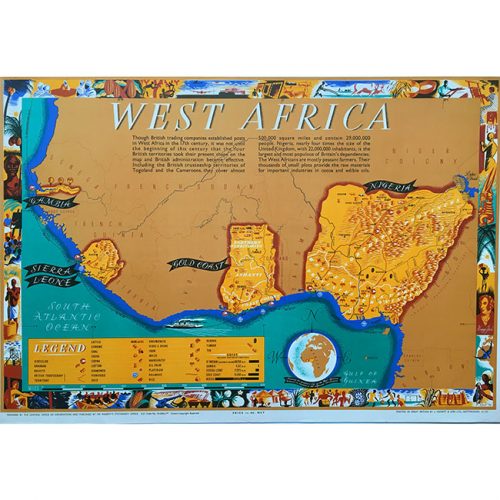
Leo Vernon
West Africa (British Empire 1948)
Printed by J.Howitt & Son Ltd Lithographic poster 20×30 inches If you are interested email info@manningfineart.co.ukor call us on 07929 749056 -
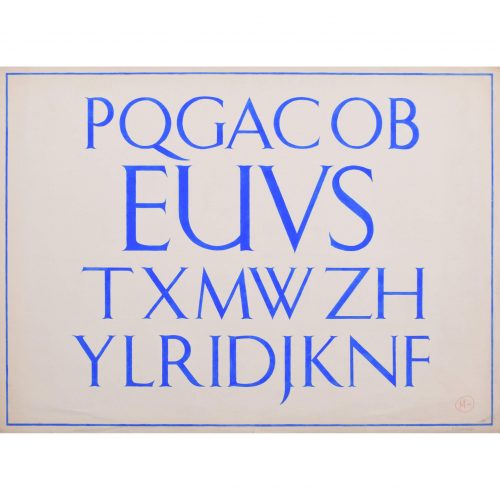
S Clapham (active 1940 - 1960)
Lettering Design
Watercolour 53 x 75 cm Examiner's mark 'M-' (likely 'lower merit') lower right within border. Signed lower right without border in pencil. A trainee architect's lettering design. It was crucial that an architectural draughtsman be skilled in depicting lettering which might appear on a building commission, and here is one of Clapham's stylish efforts, marked by an examiner. Condition: generally good, a few repaired very short edge tears not into image, with examiner's mark to bottom right. If you are interested, please email info@manningfineart.co.uk or call us on 07929 749056. Click here for other works by the artist. -
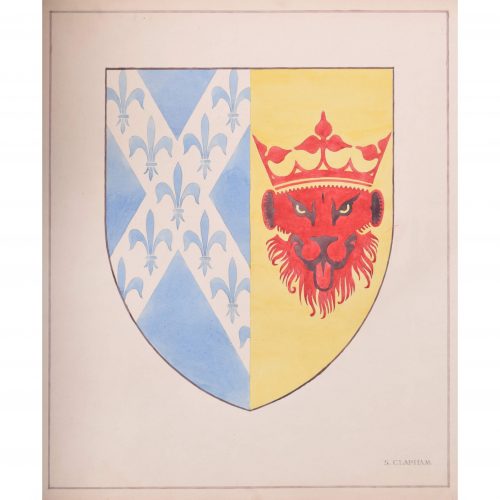
S Clapham (active 1940 - 1960)
Heraldic Design
Watercolour 51 x43 cm Signed lower right. Clapham was an architect based in Stockwell in London. Condition: very good. If you are interested, please email info@manningfineart.co.uk or call us on 07929 749056. Click here for other works by the artist. -
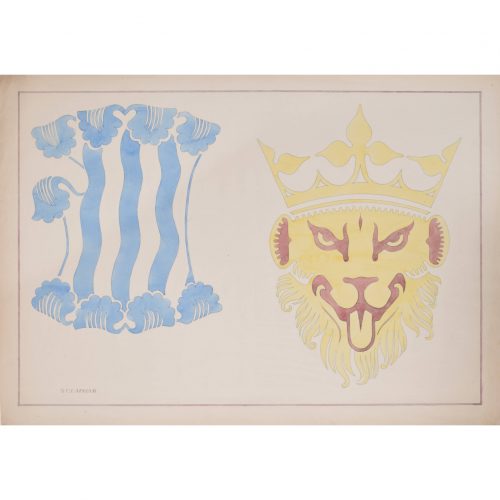
S Clapham (active 1940 - 1960)
A Pair of Heraldic Designs
Watercolour 49 x 70 cm Signed lower right. Clapham was an architect based in Stockwell in London. Condition: generally very good; short repaired edge tear (barely visible) to left side. If you are interested, please email info@manningfineart.co.uk or call us on 07929 749056. Click here for other works by the artist. -
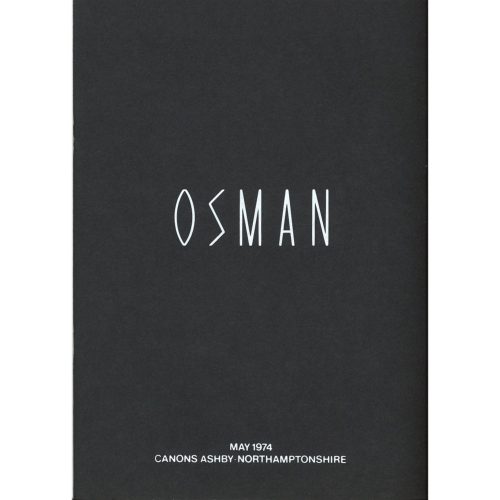
Louis Osman (1914-1996) Catalogue for May 1974 Exhibition at Canons Ashby, Northamptonshire
29.6x21.3cm (A4-sized) 24 pages plus card covers Staple bound Provenance: from the artist's estate Louis Osman (30 January 1914 - 11 April 1996) was an architect, artist, goldsmith, silversmith and medallist. Few people matched his creations as a goldsmith, and consequently he was chosen to make the crown for the Investiture of the Prince of Wales in 1969. Many of his other works are in public collections in the UK and worldwide. After Hele's school in Exeter he studied at the Bartlett School of Architecture - part of University College London - from 1931. Also attending the Slade, he left the Bartlett being awarded the top first, which brings with it the Donaldson Medal of the RIBA. Subsequently he trained with Sir Albert Richardson (who lived in a large Georgian house in Northamptonshire in which he refused to have electric light; his wife was endlessly patient with his eccentricities). Serving during the Second World War as a Major in the Intelligence Corps, he was a specialist in Air Photography and served on the Beach Reconnaissance Committee prior to the June 1944 Normandy 'D-Day' landings. Following the war he was busy as an architect, works including for Westminster Abbey, and Lincoln, Exeter, Ely and Lichfield Cathedrals. Staunton Harold Church in Ashby de la Zouch for the National Trust, and of course his own folly, the Grade I listed Elizabethan manor house, Canons Ashby in Northamptonshire - which was given to the National Trust in 1981 when Osman was not able to keep the tenancy any longer. At Canons Ashby he established a workshop and had a team of silversmiths and goldsmiths working for him. In 1974 he created the exhibition celebrated by this lavishly illustrated catalogue. His crown for the Investiture of the Prince of Wales was on display, together with many other items of his own creation, and also by other silversmiths such as Malcolm Green, Philip Noaks and Stephen Nunn, also acknowledging the work of Desmond Clenn-Murphy, Peter Musgrove and Christopher Philipson in his own works. In 1976 he made the gold enamelled casket that holds the copy of the Magna Carta on view in the United States Capitol, Washington, DC. If you are interested email info@manningfineart.co.uk or call us on 07929 749056. Condition: Excellent. As new, staple bound and staples - as always - showing slight sign of rust to the inside -
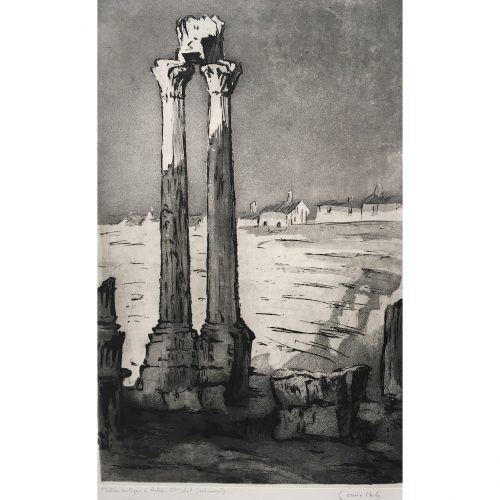
Louise Ibels (1891-1965) 'Théâtre Antique à Arles'
Etching and aquatint Signed and titled in pencil to margin 3rd state proof Approx. 39 x 25cm (plate) A French artist known for her charming etchings, here she captures the romance of the Roman Theatre in Arles. Built at the time of Augustus (27BC-14AD) it had seating for 8,000 across thirty-three tiers of steps. During the early Middle Ages it was plundered for its stone to build the town walls. These days the only part of the rear wall of the stage that survives are the two columns depicted in the print. Re-emphasised by the presence of their shadow, the rest of the view disappears softly into the distant background. If you are interested email info@manningfineart.co.uk or call us on 07929 749056. Condition: Excellent. -
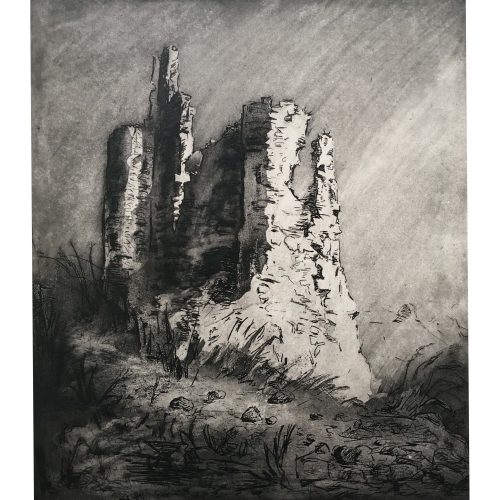
Louise Ibels (1891-1965) Castle Ruins
Etching and aquatint Signed and numbered 13/30 in pencil to margin Approx. 44x39cm (plate) A French artist known for her charming etchings, here she captures the romance of the ruined castle with the strong contrast between light and shade, a shaft of sunlight bearing down from the right. If you are interested email info@manningfineart.co.uk or call us on 07929 749056. Condition: Excellent. -
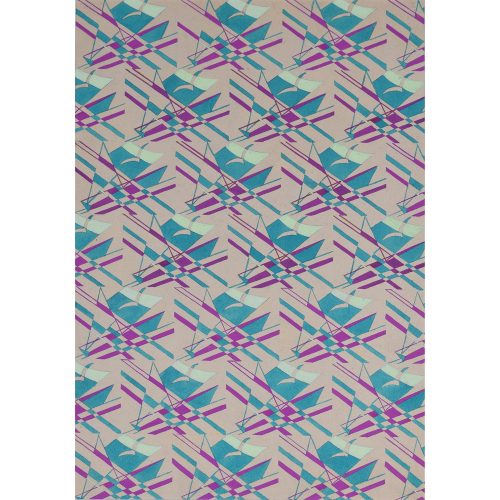
Margaret Macadam (1902-1991)
Seagull and Sailing Boat Wallpaper Design
Watercolour 27x20cm If you are interested email info@manningfineart.co.uk or call us on 07929 749056. -
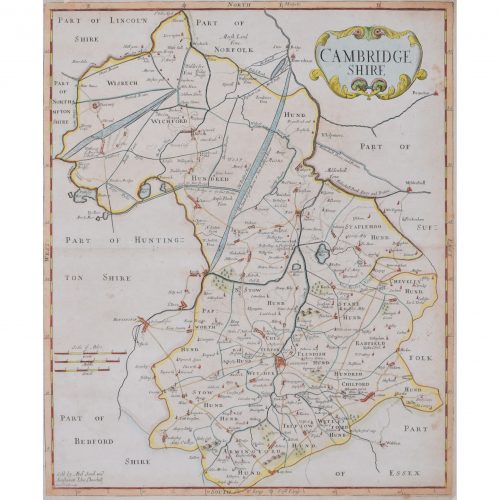
Sutton Nichols (1668 - 1729)
Map of Cambridgeshire
Engraving 43 x 36 cm Signed in plate lower left. A beautifully coloured 18th century map engraving of Cambridgeshire. The map was produced by Robert Morden for publication in Edward Gibson's 1695 translation of William Camden's Britannia, a topographical and historical survey of Great Britain and Ireland produced to "restore antiquity to Britaine, and Britain to his antiquity" - a most noble aim. William Camden (1551 - 1623) was an English antiquarian, historian, topographer, and herald, best known as the author of Britannia, the first chorographical survey of the islands of Great Britain and Ireland, and the Annales, the first detailed historical account of the Queen Elizabeth I's reign. Sutton Nicholls was a draughtsman and engraver best known for his panoramic views of the cities of London and Westminster. Almost all of his engravings were commissioned by publishers. Nicholls specialised in topographical and architectural designs; he also produced many maps, notably illustrating John Strype’s edition of John Stowe’s ‘Survey of London’ in 1720. Condition: good. Mounted to board. If you’d like to know more, please email info@manningfineart.co.uk or call us on 07929 749056. -
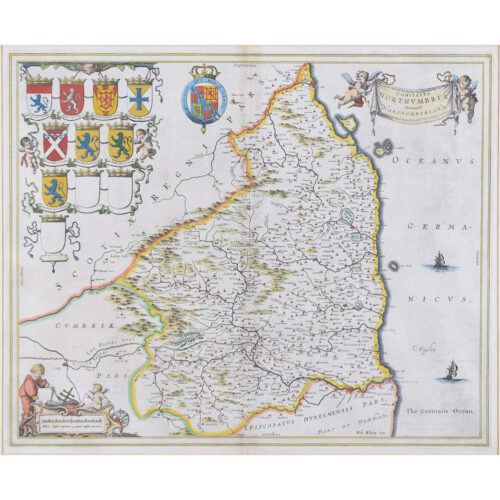
Johannes 'Joan' Blaeu (1596 - 1673)
Comitatus Northumbria, Vernacular Northumberland (1662)
Engraving with later hand-colouring 43 x 52 cm A decorative map of Northumberland by the celebrated Dutch mapmaker and artist Joan Blaeu, (son of the cartographer Willem Blaeu). Crests of the local gentry appear in the top right hand corner. Blaeu moved to Amsterdam in 1920 to join the family firm of mapmakers. In 1635, the business published the Theatrum orbis terrarum, sive, Atlas novus in two volumes - the largest and most expensive book published in the seventeenth century, and the venture for which the Blaeu were most famed. Joan and his brother Cornelius took over the studio after their father died in 1638; Joan became the official cartographer for the Dutch East India Company, as his father had been before him. Condition: very good. If you are interested, please email info@manningfineart.co.uk or call us on 07929 749056. Click here for other maps. -
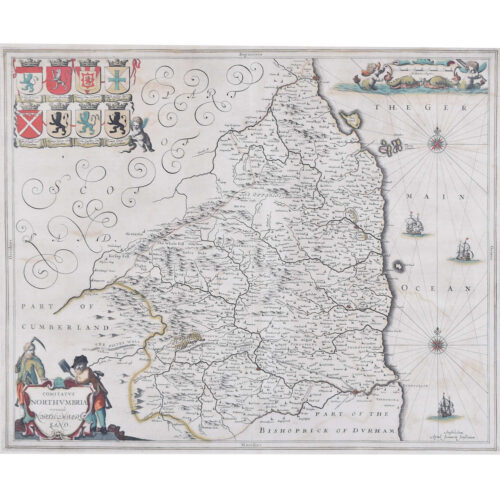
Joannem Janssonium (1588 - 1664)
Map of Northumberland (1646)
Engraving 41 x 50 cm The 1646 Latin edition. A decorative map of Northumberland by the noted Dutch mapmaker and publisher Joannem Janssonium. Condition: very good; later hand coloured. If you are interested, please email info@manningfineart.co.uk or call us on 07929 749056. Click here for other maps. -
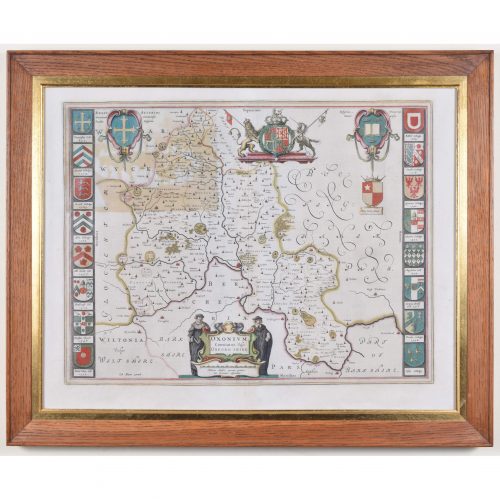
Johannes 'Joan' Blaeu (1596 - 1673)
Oxonium Comitatus, Vulgo Oxfordshire (1662)
Engraving with later hand-colouring 38 x 50 cm A decorative map of Oxfordshire by the celebrated Dutch mapmaker and artist Joan Blaeu, (son of the cartographer Willem Blaeu). Two Oxford scholars flanks the cartouche which declares the map to be of Oxonium (that is, Oxfordshire), and the design also features the arms of the British Royal Family, King Alfred, and the University of Oxford. Sixteen colleges crests border the map. Blaeu moved to Amsterdam in 1920 to join the family firm of mapmakers. In 1635, the business published the Theatrum orbis terrarum, sive, Atlas novus in two volumes - the largest and most expensive book published in the seventeenth century, and the venture for which the Blaeu were most famed. Joan and his brother Cornelius took over the studio after their father died in 1638; Joan became the official cartographer for the Dutch East India Company, as his father had been before him. Condition: mostly very good; area of toning to top left where coloured to reverse. Good oak frame. Framed with reverse visible. If you are interested, please email info@manningfineart.co.uk or call us on 07929 749056. Click here for other antique maps. -
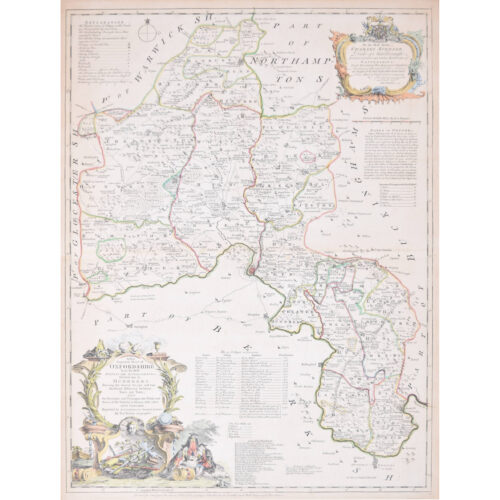
Thomas Kitchin (1719 - 1784)
Map of Oxfordshire (1764)
Engraving with later hand-colouring 72 x 54 cm This decorative map of Oxfordshire features a cartouche with three concentrating scholars and various educational trappings like rolls of parchment. The cartouche in the upper right corner dedicates the map to Charles Spencer, Duke of Marlborough, whose family seat of Blenheim Palace is just outside the city of Oxford. The map also sports a list of the University of Oxford's colleges, its rectories and vicarages, and a paragraph on the Earls of Oxford. Thomas Kitchin was an English engraver and cartographer. He was born in London and was apprenticed to the map engraver Emanuel Bowen in 1732. He produced John Elphinstone's map of Scotland (1746), the Geographia Scotiae (1749), and The Small English Atlas (1749) with Thomas Jefferys. Kitchen worked for the London Magazine and for the King; there is also some debate as to whether he passed off other cartographers' work as his own. Condition: generally very good; central fold as issued, another fold to middle of top half, three tiny losses (a millimetre or two) just outside plate mark to left side. If you are interested, please email info@manningfineart.co.uk or call us on 07929 749056. Click here for other decorative maps. -
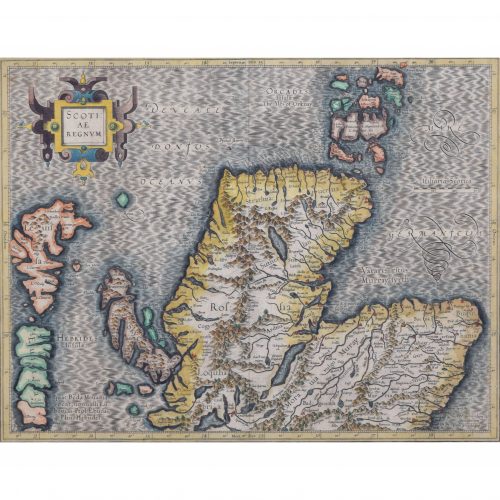
Gerardus Mercator (1512 - 1594)
Map of the North of Scotland (1683)
Engraving with later hand colouring 35 x 45 cm A fantastically characterful and detailed map engraving of the North of Scotland from 1683. The highly detailed and beautifully coloured map is inscribed to the reverse with a description of the parts of Scotland illustrated, called the ''Troisieme Table d''Escosse''. The map comes from the 1683 French edition of Gerardus Mercator''s Atlas Major, which was first published in 1585. Gerardus Mercator was the Flemish father of mapmaking. He was a skilled geographer, cosmographer and cartographer and is most renowned for creating the 1569 world map based on a new projection which represented sailing courses of constant bearing (rhumb lines) as straight lines - an innovation that is still employed in today''s nautical charts. Mercator was a highly influential pioneer in the history of cartography and is generally considered one of the founders of the Netherlandish school of cartography and geography. He is also widely considered the most notable figure of the school. In his own day, he was a notable maker of globes and scientific instruments. In addition, he had interests in theology, philosophy, history, mathematics and geomagnetism. He was also an accomplished engraver and calligrapher. Unlike other great scholars of the age, he travelled little and his knowledge of geography came from his library of over a thousand books and maps, from his visitors and from his vast correspondence (in six languages) with other scholars, statesmen, travellers, merchants and seamen. Mercator''s early maps were in large formats suitable for wall mounting but in the second half of his life, he produced over 100 new regional maps in a smaller format suitable for binding into his Atlas of 1595. This was the first appearance of the word Atlas in reference to a book of maps. However, Mercator used it as a neologism for a treatise (Cosmologia) on the creation, history and description of the universe, not simply a collection of maps. He chose the word as a commemoration of the Titan Atlas, "King of Mauretania", whom he considered to be the first great geographer. Mercator wrote on geography, philosophy, chronology and theology. All of the wall maps were engraved with copious text on the region concerned. As an example, the famous world map of 1569 is inscribed with over five thousand words in fifteen legends. Condition: a little spotting, primarily to margins. If you’d like to know more, please email info@manningfineart.co.uk or call us on 07929 749056. -
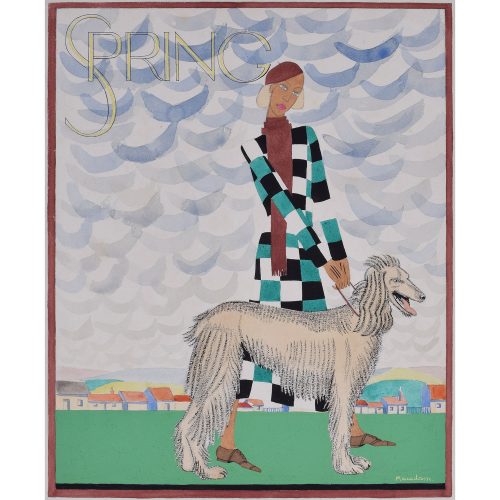
Margaret Macadam (1902-1991)
Spring: Lady with an Afghan Hound
Signed Mixed media c.1930 28x23cm If you are interested email info@manningfineart.co.uk or call us on 07929 749056. -

Macdonald (Max) Gill (1884-1947)
Australia: Her Natural and Industrial Resources (1950)
His Majesty’s Stationary Office, SO Code NO. 70-538-5-2 Lithographic poster 51 x 76cm (20 x 30 inches) Click here for biographical details and other works by the artist. Condition generally very good, a little spotting and the odd very short edge tear to margin not affecting image. If you are interested email info@manningfineart.co.uk or call us on 07929 749056. -
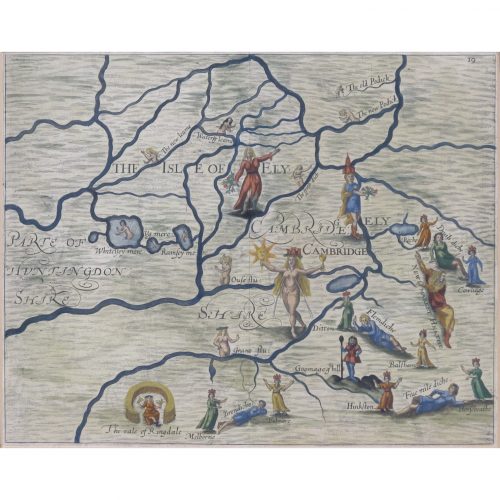
Map of Cambridge and the Isle of Ely (1622) engraved by William Hole for Drayton’s Poly Olbion
London (1622) 24 x 31 cm (9 x 12 in) If you are interested email info@manningfineart.co.uk or call us on 07929 749056. -
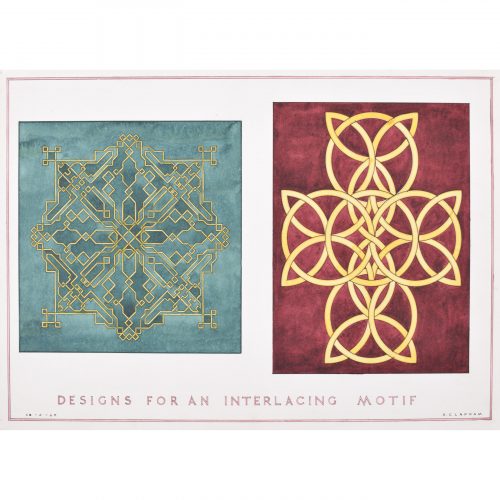
S Clapham (active 1940 - 1960)
Designs for an Interlacing Motif (1949)
Watercolour 37 x 52 cm Dated 26-2-1949 and signed. Clapham was an architect based in Stockwell in London. Condition: very good. If you are interested, please email info@manningfineart.co.uk or call us on 07929 749056. Click here for other works by the artist. -
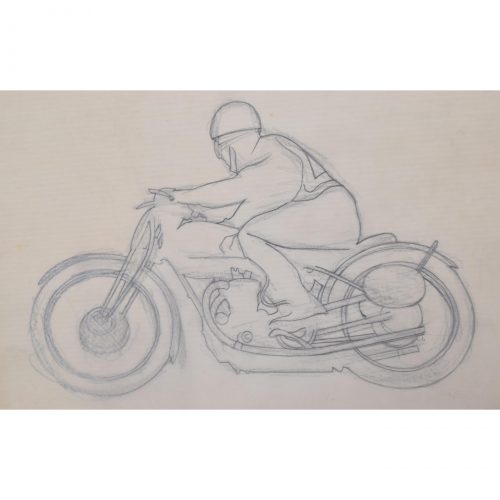
Gerald Mac Spink (flourished 1920 - 1940)
Motorcyclist
Pencil on tracing paper 20 x 32 cm Spink was a skilled artist, illustrator, and designer who produced a series of posters in the inter-war period for companies including the London Underground, Southern Railways, LNER, Hawker Engineering, and British Steel. He won a prize in 1933 from the Imperial Institute for his poster artwork. He also worked as an aeronautical engineer in Kingston-on-Thames for Hawker Engineering; his greatest achievement was the creation of the 'Squanderbug', a 500cc racing car which he built in 1947, and which races even to this day. Provenance: the artist's estate. Condition: generally very good. If you are interested, please email info@manningfineart.co.uk or call us on 07929 749056. Click here for other works by the artist. -
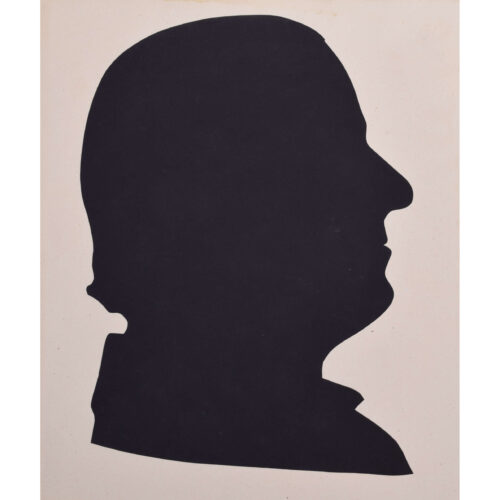
Silhouette of a Gentleman I (circa 1870)
Gouache, pen, and ink 52 x 44 cm Prior to photography, silhouettes were the easiest way of recording a person's appearance. This set might record the group present at a country house party, a wedding, or other similar convivial occasion. Condition: generally very good. If you are interested, please email info@manningfineart.co.uk or call us on 07929 749056. Click here for other silhouettes. -
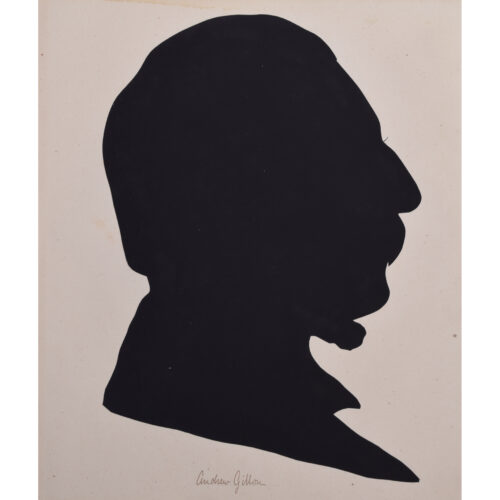
Silhouette (circa 1870)
Andrew Gillon
Gouache, pen, and ink 52 x 44 cm Prior to photography, silhouettes were the easiest way of recording a person's appearance. This set might record the group present at a country house party, a wedding, or other similar convivial occasion. Condition: generally good; some staining to upper edge. If you are interested, please email info@manningfineart.co.uk or call us on 07929 749056. Click here for other silhouettes. -
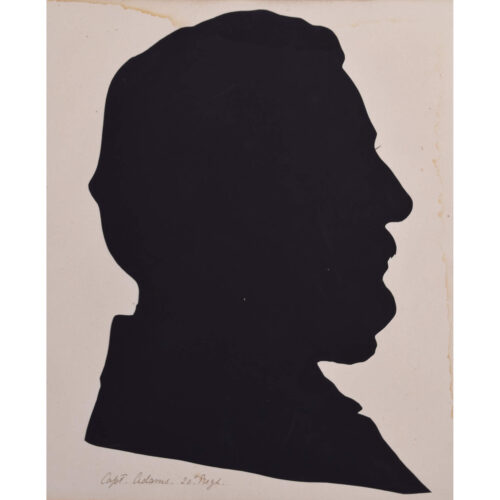
Silhouette (circa 1870)
Captain Adams, 20th Regt
Gouache, pen, and ink 52 x 44 cm Prior to photography, silhouettes were the easiest way of recording a person's appearance. This set might record the group present at a country house party, a wedding, or other similar convivial occasion. Condition: generally good; some staining to upper and right margins. If you are interested, please email info@manningfineart.co.uk or call us on 07929 749056. Click here for other silhouettes. -
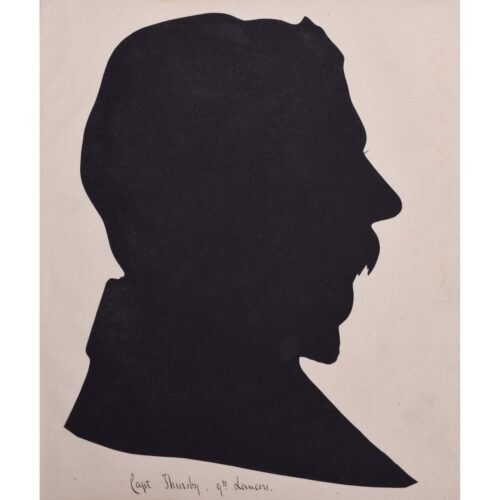
Silhouette (circa 1870)
Captain Thursby, 9th Lancers
Gouache, pen, and ink 52 x 44 cm Captain Piers Thursby was born in 1834 and served in the 9th Queen's Royal Lancers, a cavalry regiment of the British Army, with whom he served during the Indian Mutiny of the 1850s. He was the son of Revd. W. Thursby of Ormerod House and died in 1904. Prior to photography, silhouettes were the easiest way of recording a person's appearance. This set might record the group present at a country house party, a wedding, or other similar convivial occasion. Condition: generally very good; some staining to right edge. If you are interested, please email info@manningfineart.co.uk or call us on 07929 749056. Click here for other silhouettes. -
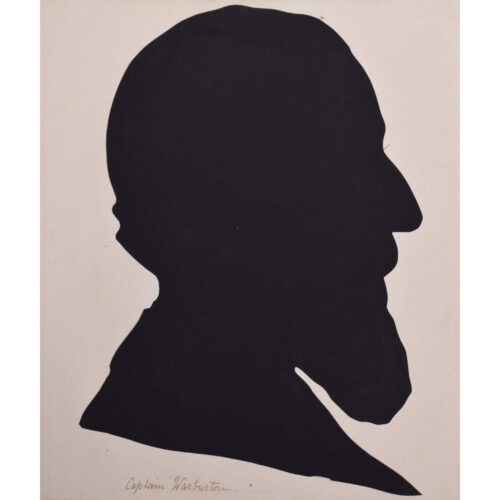
Silhouette (circa 1870)
Captain Warburton
Gouache, pen, and ink 52 x 44 cm Prior to photography, silhouettes were the easiest way of recording a person's appearance. This set might record the group present at a country house party, a wedding, or other similar convivial occasion. Condition: generally very good; occasional spots. If you are interested, please email info@manningfineart.co.uk or call us on 07929 749056. Click here for other silhouettes. -
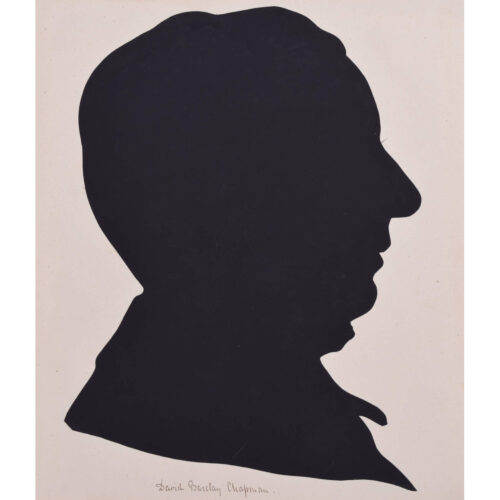
Silhouette (circa 1870)
David Barclay Chapman
Gouache, pen, and ink 52 x 44 cm David Barclay Chapman was a partner in the bank which in 1896 became the Limited Company Barclay & Co, known today as Barclay's. Two of his daughters appear in other silhouettes from this particular set. Prior to photography, silhouettes were the easiest way of recording a person's appearance. This set might record the group present at a country house party, a wedding, or other similar convivial occasion. Condition: generally good; some staining to upper edge. If you are interested, please email info@manningfineart.co.uk or call us on 07929 749056. Click here for other silhouettes. -
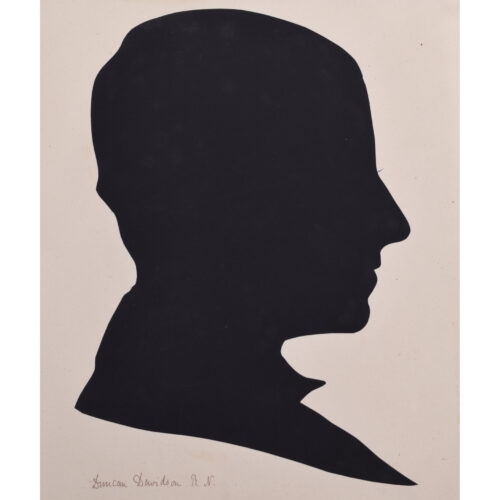
Silhouette (circa 1870)
Duncan Davidson RN
Gouache, pen, and ink 52 x 44 cm Captain Duncan George Davidson was born in 1833 served in the Royal Navy. He became a Captain in 1872 and captained H.M.S. Serapis between 1876 and 1879; he retired a year later. Prior to photography, silhouettes were the easiest way of recording a person's appearance. This set might record the group present at a country house party, a wedding, or other similar convivial occasion. Condition: generally very good. If you are interested, please email info@manningfineart.co.uk or call us on 07929 749056. Click here for other silhouettes. -
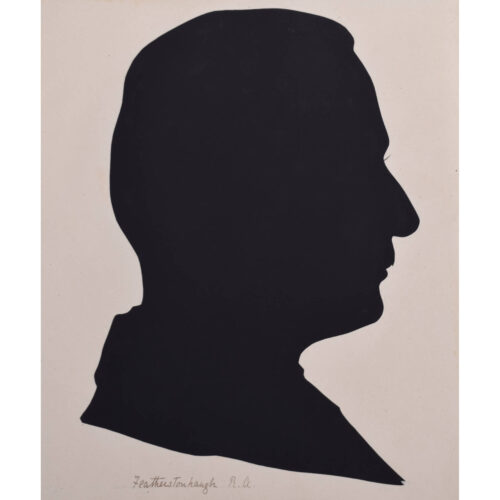
Silhouette (circa 1870)
Major Chaplin, 3rd Dragoon Guards
Gouache, pen, and ink 52 x 44 cm A silhouette of Featherstone (Christian name and rank unknown) of the Royal Artillery. Prior to photography, silhouettes were the easiest way of recording a person's appearance. This set might record the group present at a country house party, a wedding, or other similar convivial occasion. Condition: generally very good. If you are interested, please email info@manningfineart.co.uk or call us on 07929 749056. Click here for other silhouettes. -
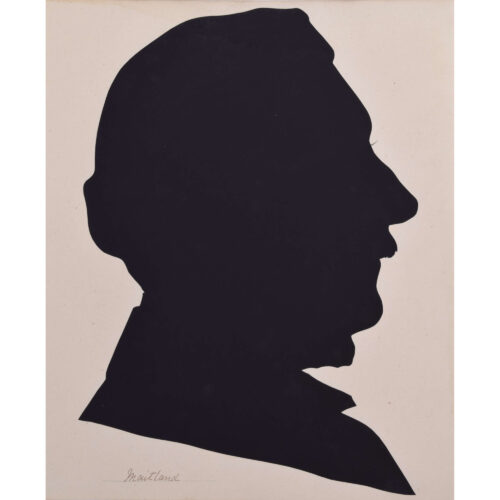
Silhouette (circa 1870)
Maitland
Gouache, pen, and ink 52 x 44 cm Prior to photography, silhouettes were the easiest way of recording a person's appearance. This set might record the group present at a country house party, a wedding, or other similar convivial occasion. Condition: very good. If you are interested, please email info@manningfineart.co.uk or call us on 07929 749056. Click here for other silhouettes. -
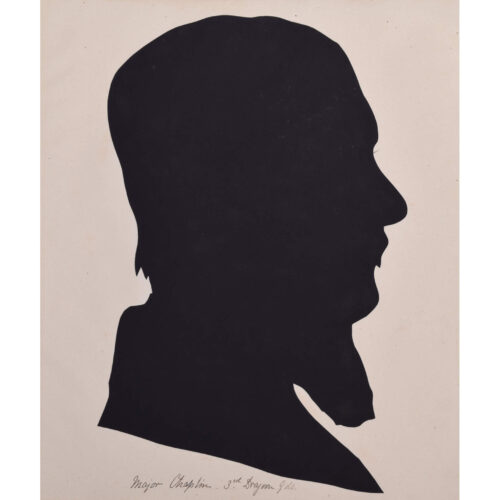
Silhouette (circa 1870)
Major Chaplin, 3rd Dragoon Guards
Gouache, pen, and ink 52 x 44 cm Silhouettes of Mrs F Chaplin and Miss Chaplain, likely the Major's wife and daughter, are also available. Prior to photography, silhouettes were the easiest way of recording a person's appearance. This set might record the group present at a country house party, a wedding, or other similar convivial occasion. Condition: generally very good; some staining to right edge. If you are interested, please email info@manningfineart.co.uk or call us on 07929 749056. Click here for other silhouettes. -
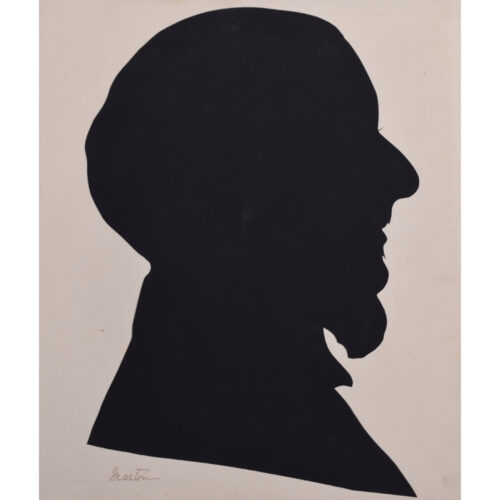
Silhouette (circa 1870)
Marton
Gouache, pen, and ink 52 x 44 cm Prior to photography, silhouettes were the easiest way of recording a person's appearance. This set might record the group present at a country house party, a wedding, or other similar convivial occasion. Condition: generally very good. If you are interested, please email info@manningfineart.co.uk or call us on 07929 749056. Click here for other silhouettes. -
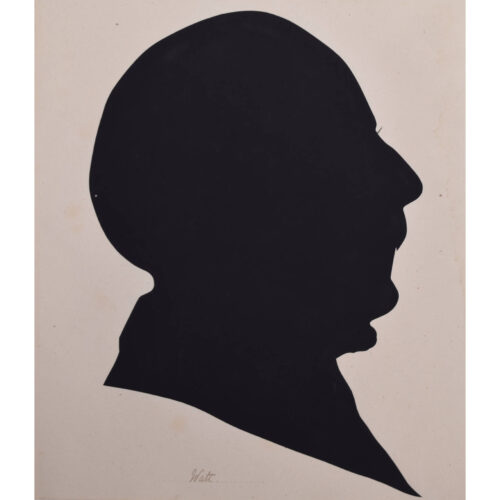
Silhouette (circa 1870)
Watt
Gouache, pen, and ink 52 x 44 cm Prior to photography, silhouettes were the easiest way of recording a person's appearance. This set might record the group present at a country house party, a wedding, or other similar convivial occasion. Condition: generally very good. If you are interested, please email info@manningfineart.co.uk or call us on 07929 749056. Click here for other silhouettes. -
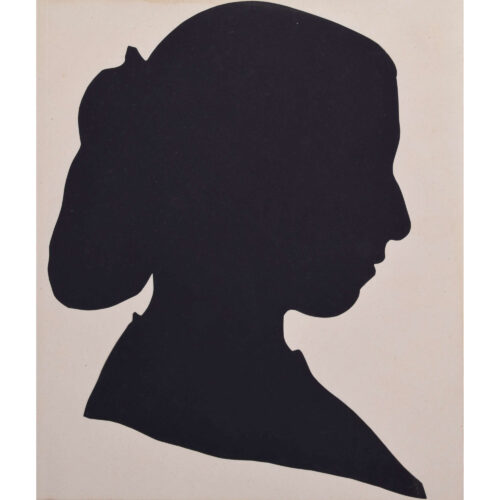
Silhouette of Lady I (circa 1870)
Gouache, pen, and ink 52 x 44 cm Prior to photography, silhouettes were the easiest way of recording a person's appearance. This set might record the group present at a country house party, a wedding, or other similar convivial occasion. Condition: generally good; some staining to upper edge. If you are interested, please email info@manningfineart.co.uk or call us on 07929 749056. Click here for other silhouettes. -
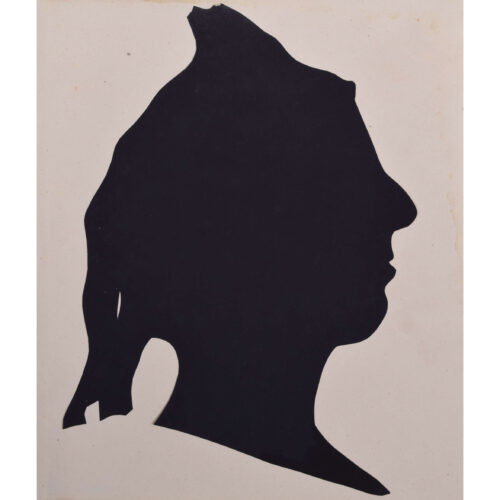
Silhouette of Lady II (circa 1870)
Gouache, pen, and ink 52 x 44 cm Prior to photography, silhouettes were the easiest way of recording a person's appearance. This set might record the group present at a country house party, a wedding, or other similar convivial occasion. Condition: generally good; some staining to edges. If you are interested, please email info@manningfineart.co.uk or call us on 07929 749056. Click here for other silhouettes. -
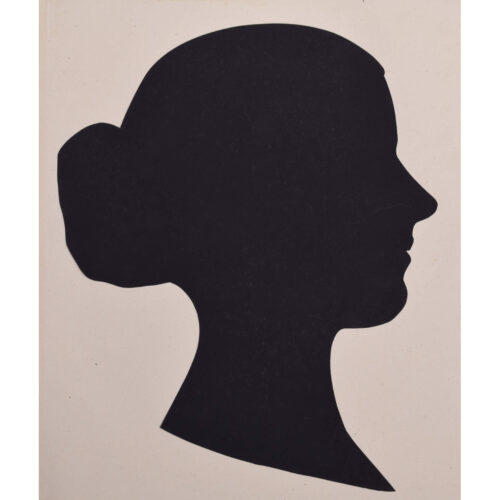
Silhouette of a Lady III (circa 1870)
Gouache, pen, and ink 52 x 44 cm Prior to photography, silhouettes were the easiest way of recording a person's appearance. This set might record the group present at a country house party, a wedding, or other similar convivial occasion. Condition: very good. If you are interested, please email info@manningfineart.co.uk or call us on 07929 749056. Click here for other silhouettes. -
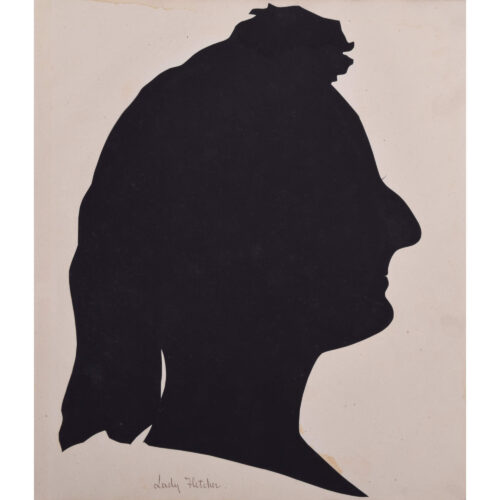
Silhouette (circa 1870)
Lady Fletcher
Gouache, pen, and ink 52 x 44 cm Prior to photography, silhouettes were the easiest way of recording a person's appearance. This set might record the group present at a country house party, a wedding, or other similar convivial occasion. Condition: generally very good; some light staining to right edge. If you are interested, please email info@manningfineart.co.uk or call us on 07929 749056. Click here for other silhouettes. -
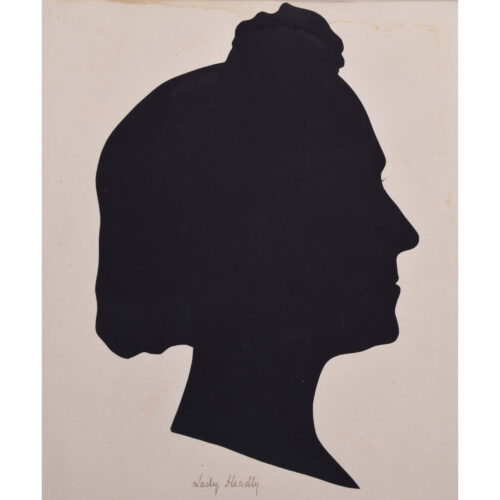
Silhouette (circa 1870)
Lady Headley
Gouache, pen, and ink 52 x 44 cm A silhouette depicting Lady Headley, likely the wife of the 6th or 7th Baron Headley. Lord Headley, Baron Allanson and Winn, of Aghadoe in the County of Kerry, was a title in the Peerage of Ireland, first created in 1797. Prior to photography, silhouettes were the easiest way of recording a person's appearance. This set might record the group present at a country house party, a wedding, or other similar convivial occasion. Condition: generally good; some staining. If you are interested, please email info@manningfineart.co.uk or call us on 07929 749056. Click here for other silhouettes. -
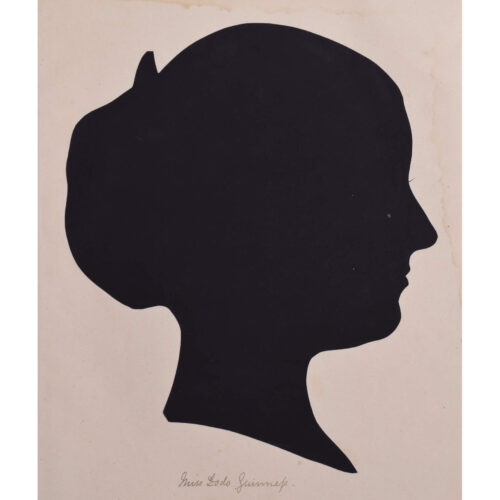
Silhouette (circa 1870)
Miss Dodo Guinness
Gouache, pen, and ink 52 x 44 cm Adelaide Maud Guinness, nicknamed 'Dodo', was descended from the banking line of Guinnesses. Her father was the barrister and MP Richard Samuel Guinness. Dodo married Edward Cecil Guinness, the 1st Earl of Iveagh and her third cousin, in 1873. Edward's father had died in 1868, after which Edward inherited a share of the famous Guinness brewery. The Guinness family seat is Elveden Hall in Suffolk. Prior to photography, silhouettes were the easiest way of recording a person's appearance. This set might record the group present at a country house party, a wedding, or other similar convivial occasion. Condition: generally good; some staining to upper edge. If you’d like to know more, please email info@manningfineart.co.uk or call us on 07929 749056. -
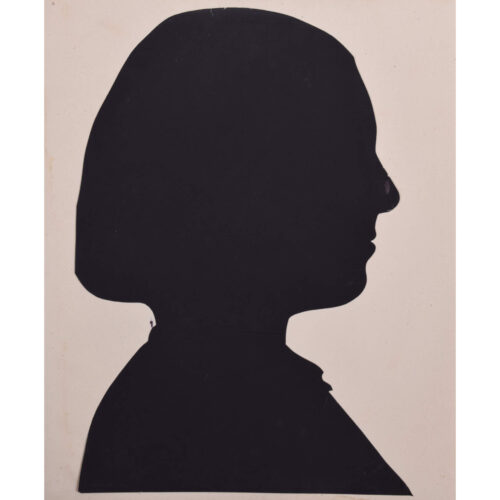
Silhouette (circa 1870)
Miss Alice Lowneley
Gouache, pen, and ink 52 x 44 cm Prior to photography, silhouettes were the easiest way of recording a person's appearance. This set might record the group present at a country house party, a wedding, or other similar convivial occasion. Condition: generally good; some staining. If you are interested, please email info@manningfineart.co.uk or call us on 07929 749056. Click here for other silhouettes. -
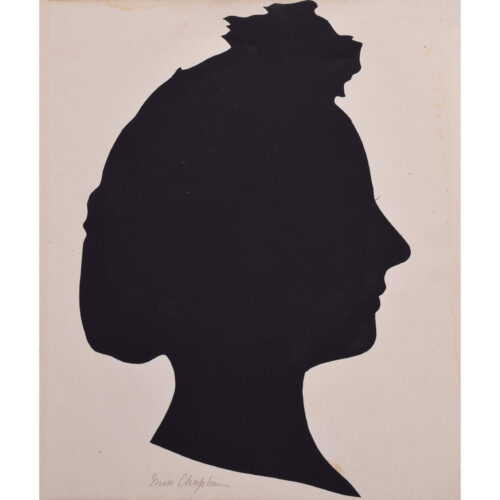
Silhouette (circa 1870)
Miss Chaplin
Gouache, pen, and ink 52 x 44 cm Prior to photography, silhouettes were the easiest way of recording a person's appearance. This set might record the group present at a country house party, a wedding, or other similar convivial occasion. Condition: good. Some staining at upper and right edges. If you are interested, please email info@manningfineart.co.uk or call us on 07929 749056. Click here for other silhouettes. -
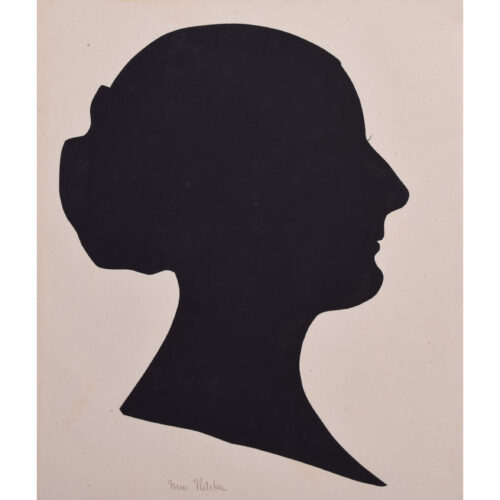
Silhouette (circa 1870)
Miss Fletcher
Gouache, pen, and ink 52 x 44 cm Prior to photography, silhouettes were the easiest way of recording a person's appearance. This set might record the group present at a country house party, a wedding, or other similar convivial occasion. Condition: generally very good. If you are interested, please email info@manningfineart.co.uk or call us on 07929 749056. Click here for other silhouettes. -
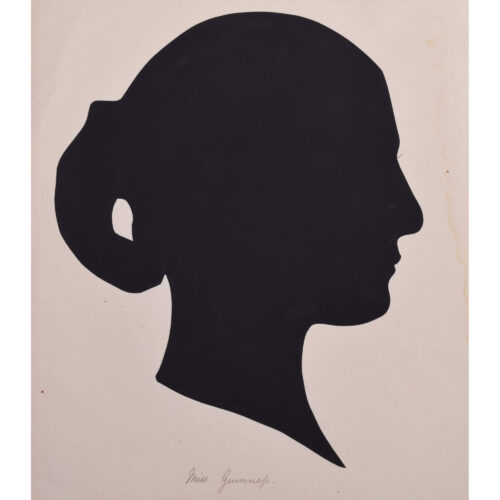
Silhouette (circa 1870)
Miss Guinness
Gouache, pen, and ink 52 x 44 cm Silhouettes of other members of the Guinness family of brewers and bankers are also available in this set. The Guinness family seat is Elveden Hall in Suffolk. Prior to photography, silhouettes were the easiest way of recording a person's appearance. This set might record the group present at a country house party, a wedding, or other similar convivial occasion. Condition: generally good; some staining to edges. If you are interested, please email info@manningfineart.co.uk or call us on 07929 749056. Click here for other silhouettes. -
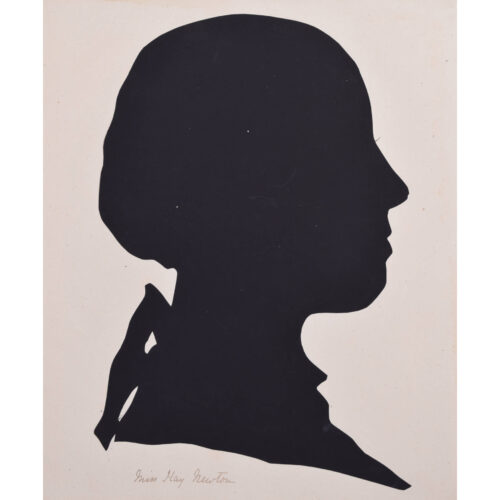
Silhouette (circa 1870)
Miss Hay Newton
Gouache, pen, and ink 52 x 44 cm The Hay-Newtons were a wealthy family from East Lothian in Scotland. Prior to photography, silhouettes were the easiest way of recording a person's appearance. This set might record the group present at a country house party, a wedding, or other similar convivial occasion. Condition: very good. If you are interested, please email info@manningfineart.co.uk or call us on 07929 749056. Click here for other silhouettes. -
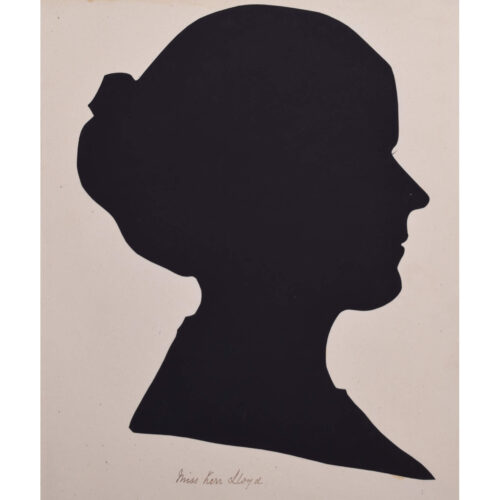
Silhouette (circa 1870)
Miss Kerr Lloyd
Gouache, pen, and ink 52 x 44 cm Prior to photography, silhouettes were the easiest way of recording a person's appearance. This set might record the group present at a country house party, a wedding, or other similar convivial occasion. Condition: very good. If you are interested, please email info@manningfineart.co.uk or call us on 07929 749056. Click here for other silhouettes. -
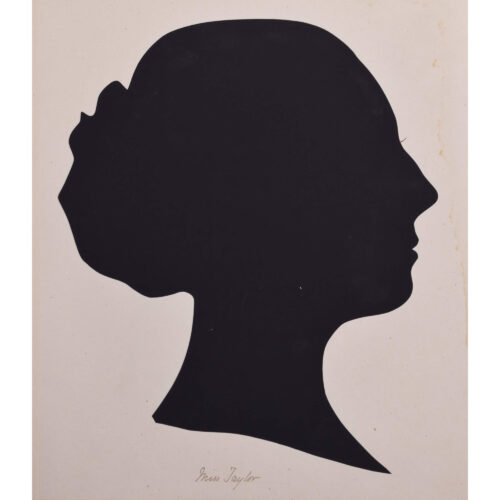
Silhouette (circa 1870)
Miss Taylor
Gouache, pen, and ink 52 x 44 cm Prior to photography, silhouettes were the easiest way of recording a person's appearance. This set might record the group present at a country house party, a wedding, or other similar convivial occasion. Condition: good; some staining to right edge. If you are interested, please email info@manningfineart.co.uk or call us on 07929 749056. Click here for other silhouettes. -
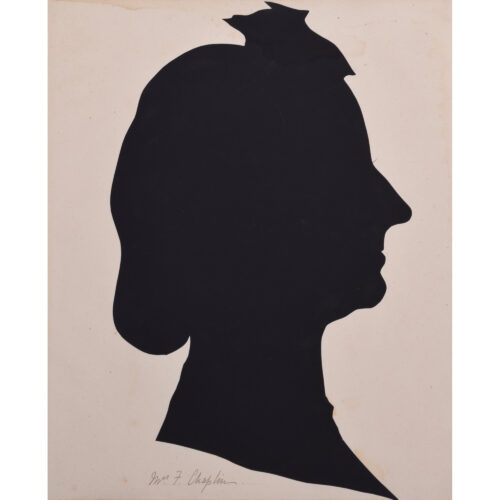
Silhouette (circa 1870)
Mrs F Chaplin
Gouache, pen, and ink 52 x 44 cm Prior to photography, silhouettes were the easiest way of recording a person's appearance. This set might record the group present at a country house party, a wedding, or other similar convivial occasion. Condition: generally good; some staining. If you are interested, please email info@manningfineart.co.uk or call us on 07929 749056. Click here for other silhouettes. -
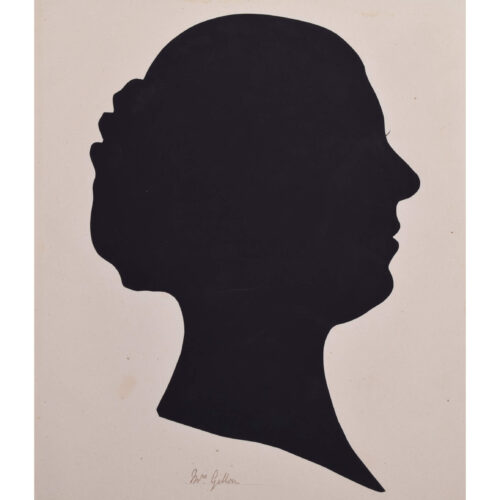
Silhouette (circa 1870)
Mrs Gillon
Gouache, pen, and ink 52 x 44 cm Prior to photography, silhouettes were the easiest way of recording a person's appearance. This set might record the group present at a country house party, a wedding, or other similar convivial occasion. Condition: generally very good; some light staining. If you are interested, please email info@manningfineart.co.uk or call us on 07929 749056. Click here for other silhouettes. -
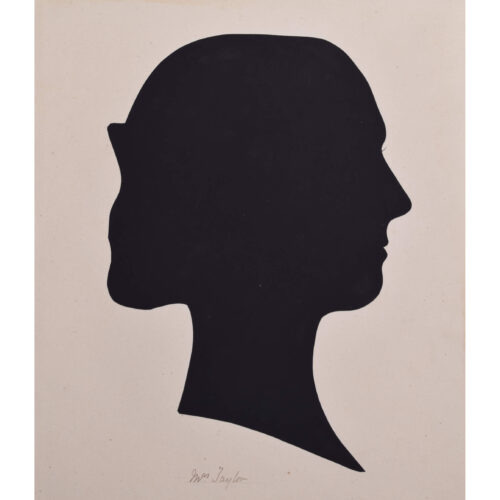
Silhouette (circa 1870)
Mrs Taylor
Gouache, pen, and ink 52 x 44 cm Prior to photography, silhouettes were the easiest way of recording a person's appearance. This set might record the group present at a country house party, a wedding, or other similar convivial occasion. Condition: generally very good. If you are interested, please email info@manningfineart.co.uk or call us on 07929 749056. Click here for other silhouettes.

